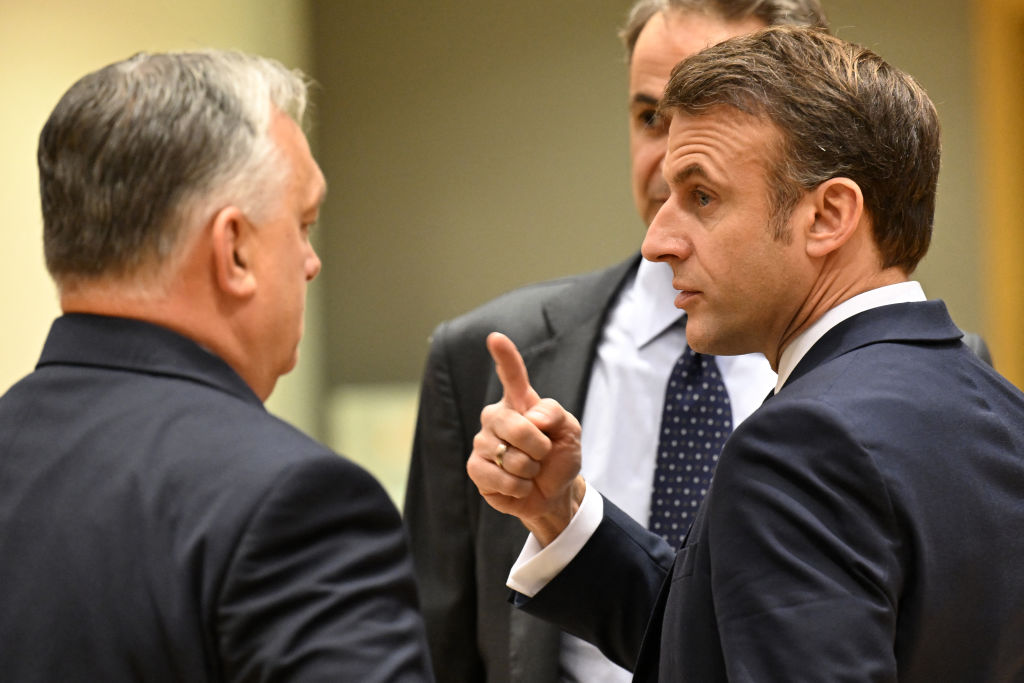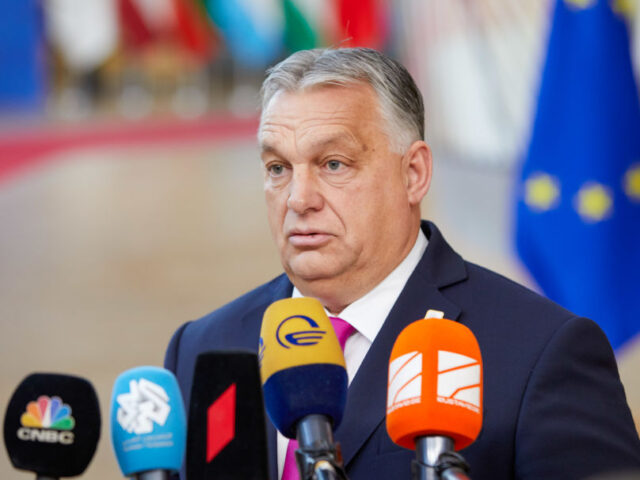Hungarian Prime Minister Viktor Orban has restated his position that Ukraine is not, by the EU’s own accession rules, ready to join the bloc and that no exception should be granted for this process ahead of a crunch meeting of European Union member heads of state (EUCO) today.
The presidents, prime ministers, and chancellors of European nations are meeting in Brussels today, with the enlargement of the bloc with new members, the war on the bloc’s borders in Ukraine, and the Israel-Gaza war all on the agenda. While many top European figures repeatedly express their desire to move on Ukraine’s potential future membership of the bloc, the EUCO meeting is set to feature a showdown between those pro-expansionist leaders and Hungary’s Viktor Orban, who preaches caution and warns the bloc’s own rules shouldn’t be set aside to expand into Ukraine at any cost.
“Enlargement is a merit-based process. There are no exceptions!”, Orban wrote as he had pre-conference meetings with top European leaders — apparently in a bid by characters like the German chancellor and European President Ursula von der Leyen to persuade Orban to climb down from his position — having earlier said Ukraine having a “swift” accession would have negative consequences for the European bloc.

France’s President Emmanuel Macron (R) gestures as he talks with Hungary’s Prime Minister Viktor Orban (L) as they attend a roundtable meeting of the European Council at the European headquarters in Brussels, on December 14, 2023. EU leaders are meeting in Brussels in what is seen as an opportunity to reaffirm the EU membership’s perspective of the Western Balkans. The crunch summit in Brussels, which diplomats fear could drag on longer than the two days planned, comes as fears mount over Western backing for Ukraine nearly two years into Russia’s war. (Photo by Miguel MEDINA / AFP) (Photo by MIGUEL MEDINA/AFP via Getty Images)
‘Ukraine Belongs to Our European Family’ But Needs to Address Corruption First, Says Brussels https://t.co/92sxJV8xNg
— Breitbart London (@BreitbartLondon) November 9, 2023
Last night, Orban laid out his concerns, saying that Ukraine’s: “swift accession to the European Union would have devastating consequences for European [farmers], the EU’s budget and European security. It serves the best interests of neither Hungary, nor the European Union, therefore we cannot support it!”.
Speaking to press outside the EUCO meeting on Thursday morning, Orban defended the rules, procedures, and norms of the European Union against those leading figures within the bloc who he accuses of wanting to bend and break the rules to expand faster. He said today: “Enlargement is not a theoretical issue. Enlargement is a merit-based, legally detailed process, which has preconditions. We have set up seven preconditions and even by the evaluation of the Commission, three out of the seven is not fulfilled. So there is no reason to negotiate membership of Ukraine.”
Orban said he suspected that there were actually several more areas in which Ukraine hadn’t developed enough to qualify as a European Union member state, but nevertheless, “three is enough” to know it isn’t ready, and therefore “there is no chance to start to negotiate.”
Meanwhile, other European member state leaders line up to say how important Ukrainian membership is to the bloc. Europe has a “moral responsibility, European parliament president Roberta Metsola says, and enlarging the European Union is a “win-win”.
Ukraine has, for its part, pleaded with European leaders to brush concerns aside and sign off on fast-tracking it becoming a European Union member state. Olga Stefanishyna, Ukraine’s deputy prime minister for European integration made an oblique reference to Hungary’s blocking vote, writing this morning: “The stakes are too high to have someone play with it.”
❗️@PM_ViktorOrban held talks with the leaders of the EU institutions and several Member States this morning, before the start of the EU summit. The meeting was attended by @EmmanuelMacron, @Bundeskanzler, @vonderleyen and @eucopresident. pic.twitter.com/10y4ExVsT9
— Zoltan Kovacs (@zoltanspox) December 14, 2023
Hungary’s Orbán Says Ukraine Is ‘Light Years Away’ From Joining European Unionhttps://t.co/1UK6B1GTcD
— Breitbart London (@BreitbartLondon) November 19, 2023
Ukrainian President Volodymyr Zelensky was much more direct, using an appeal to be on the right side of history in his message to EU leaders. In a video address delivered today, he told them: “This day will go down in our history. Whether it’s good or bad for us, history will capture everything. Every word, every step, every action and inaction. Who fought for what… Nobody wants Europe to be seen as untrustworthy.”
Zelensky’s remarks took on a steel edge as he outright told Europe they needed to come around to his way of thinking to avoid being invaded themselves. He continued: ” If no one believes in Europe, what will keep the European Union alive? People in Europe won’t see any benefit if Moscow receives a pass from Brussels in the form of negativity towards Ukraine.
“Putin will surely use this against you personally, and against all of Europe. Don’t give him this first – and only – victory of the year. Europe must win, agreements must be honoured, and words must matter.”
The appeal to history and destiny by Zelensky closely mirrors the comments of European leaders like the Commission’s Ursula von der Leyen who spoke of a “call of history” and a “natural horizon” follow other such remarks by Von der Leyen last year, when she said of Ukraine that: “…they belong to us. They are one of us and we want them in”.
One of the questions to be answered at the EUCO conference is whether to formally invite Ukraine, presently an EU candidate state, to begin membership negotiations. To do so requires a unanimous decision of all European Union member states, so if Hungary can’t be persuaded or forced into backing negotiations, they won’t take place.
The unelected leader of the European Commission said the European Union will not be “complete” until Ukraine, Moldova, Georgia, and the Western Balkans are absorbed by it.https://t.co/aW40WDigwA
— Breitbart London (@BreitbartLondon) September 15, 2022
While Hungary is not alone in concern with the speed of Ukraine’s accession — Austria, Italy, and Greece have also spoken out — Hungary is by far the most vocal and has become the lightning rod for criticism from pro-Kyiv movers in Brussels.
Unanimity is one of the fundamental principles of the European Union, a mechanism that gives all states an absolute veto on key matters. This helps keep the continental power bloc together as it reassures the smaller, less populous states — like Hungary, for instance — that they cannot be railroaded by the handful of powerful nations that rule and pay for the Union like France, Germany, and until recently, the United Kingdom.
Despite the key importance of unanimity in persuading those smaller EU states that they are safer inside Europe than out, there are key European players who want to see it abolished, as it can be a stumbling block to European projects. Arch-Eurofederalist Guy Verhofstadt, who took Brexit so personally and campaigned tirelessly to prevent it, has said the measure kills “the EU’s credibility” because the process of bringing all members to agree on a course of action can be slow.

COMMENTS
Please let us know if you're having issues with commenting.